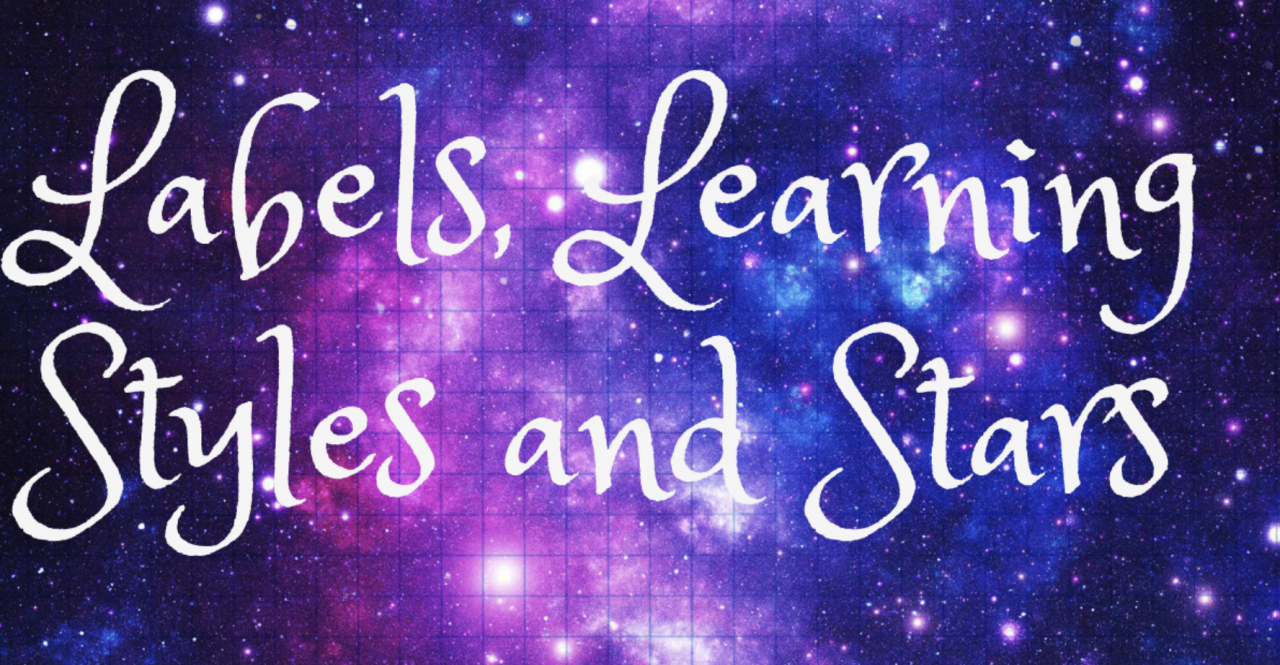- Home
- News & Networking
- Blog
- Jessica Conrad
- Labels, Learning Styles and Stars
Labels, Learning Styles and Stars
How would you label yourself as a learner? Take a moment to think about some words you’d use.
Did you use your astrology sign? No?
When I was in high school my career counselor helped me pick a major. I took some tests which yielded lists of potential careers. Every week I studied them and shrugged.
During our last session, he sighed and said, “let’s check your horoscope.”
We pulled up a list of suggested careers for Geminis and laid my career assessment list next to it. One career showed up on both lists: speech-language pathologist. I never knew that was a thing, but I said I’d try it and I haven’t changed my mind since.
However, I do not recommend the Jessica Conrad Horoscope Method for choosing careers or to better understand your student’s possibilities. There is zero science or rationale behind it. I could have just as easily been an antique dealer. I hate The Antique Roadshow.
Also worth noting: it turns out I’m not a Gemini. This whole time, I’ve been a Taurus.
When the news broke at NASA that the astrological charts were out of whack for various reasons, I was shocked. Go ahead and look at the new suggested dates. If your sign changed, do you feel a pang of denial or disbelief, even if you use it for entertainment? I did. It’s hard to let go of that label.
Humans like labels. We are programmed to like knowing who are “our people” and who isn’t, what we are and what we aren’t. It helps us feel safe, helps us feel like we understand things, whether it’s true or not.
Go back to my first question, how you would label yourself as a learner. Did you use any of these terms:
Visual learner
Auditory learner
Kinesthetic learner
Or something like that? Several years after I picked my career from an astrology website, I was sitting in a class where the lecturer announced in passing “there’s no such thing as a learning style.”
I felt my foundation of identity rock a little when I heard that. Learning styles aren’t real? “Say’s who?” I wondered because I knew that I was a visual learner. I took a little learning quiz once and my teachers reaffirmed it and I felt it deep in my bones. Give me a book over a lecture any day. I was great at understanding graphs. Didn’t that mean anything?
A little digging revealed decades of research reaffirming the truth: our brains are amazing and complex and cannot be categorized with the decades-old hypothesis that I am wired to learn one way and others another. We still have a lot to discover about brains and learning, but the learning styles myth doesn’t hold any water or make any difference in instruction. You can read this analysis for post-college learning, and this meta-analysis summary from Indiana Wesleyan University and the research article published this year from Indiana University. You can also listen to Tesia Marshik’s Ted Talk on learning styles and the importance of critical self-reflection.
It’s hard to adopt that new information in the face of what we feel is correct. Our brains are wired to identify it as a threat, seeing information that opposes our strongly held belief no different than a lion trying to eat us. It’s hard but important! Why bother writing this and debunking the myth? Besides promoting evidence-based practice, bad information hurts kids.
For example, a young me who saw the list of careers like “engineer” and “concert vocalist” under different learning styles and thought they were out of reach. My high school student refusing to give geometry another try because “I’m just not a visual learner.” The guidance counselor who advised my friend to not pursue nursing because there was so much reading and not enough kinesthetic learning for her.
There’s a lot of other labels and titles we throw around:
Stubborn. Sensitive. Flighty. Rude. High-functioning. Low-functioning. Special. Gifted. Delayed. Aggressive. Picky. Not Diploma Track Ready.
All labels we’ve seen passed around a conference table helping us make very big decisions about what that student’s future of learning might be.
I challenge you to pause and wonder, what if the label isn't true?
So all of this begs the question: if not learning styles, then what? How do we ensure we are reaching all students? PATINS Project highly recommends Universal Design for Learning and the research behind it. We’ve got great resources and specialists who can assist you in designing for all learners in mind.
Did you use your astrology sign? No?
When I was in high school my career counselor helped me pick a major. I took some tests which yielded lists of potential careers. Every week I studied them and shrugged.
During our last session, he sighed and said, “let’s check your horoscope.”
We pulled up a list of suggested careers for Geminis and laid my career assessment list next to it. One career showed up on both lists: speech-language pathologist. I never knew that was a thing, but I said I’d try it and I haven’t changed my mind since.
However, I do not recommend the Jessica Conrad Horoscope Method for choosing careers or to better understand your student’s possibilities. There is zero science or rationale behind it. I could have just as easily been an antique dealer. I hate The Antique Roadshow.
Also worth noting: it turns out I’m not a Gemini. This whole time, I’ve been a Taurus.
When the news broke at NASA that the astrological charts were out of whack for various reasons, I was shocked. Go ahead and look at the new suggested dates. If your sign changed, do you feel a pang of denial or disbelief, even if you use it for entertainment? I did. It’s hard to let go of that label.
Humans like labels. We are programmed to like knowing who are “our people” and who isn’t, what we are and what we aren’t. It helps us feel safe, helps us feel like we understand things, whether it’s true or not.
Go back to my first question, how you would label yourself as a learner. Did you use any of these terms:
Visual learner
Auditory learner
Kinesthetic learner
Or something like that? Several years after I picked my career from an astrology website, I was sitting in a class where the lecturer announced in passing “there’s no such thing as a learning style.”
I felt my foundation of identity rock a little when I heard that. Learning styles aren’t real? “Say’s who?” I wondered because I knew that I was a visual learner. I took a little learning quiz once and my teachers reaffirmed it and I felt it deep in my bones. Give me a book over a lecture any day. I was great at understanding graphs. Didn’t that mean anything?
A little digging revealed decades of research reaffirming the truth: our brains are amazing and complex and cannot be categorized with the decades-old hypothesis that I am wired to learn one way and others another. We still have a lot to discover about brains and learning, but the learning styles myth doesn’t hold any water or make any difference in instruction. You can read this analysis for post-college learning, and this meta-analysis summary from Indiana Wesleyan University and the research article published this year from Indiana University. You can also listen to Tesia Marshik’s Ted Talk on learning styles and the importance of critical self-reflection.
It’s hard to adopt that new information in the face of what we feel is correct. Our brains are wired to identify it as a threat, seeing information that opposes our strongly held belief no different than a lion trying to eat us. It’s hard but important! Why bother writing this and debunking the myth? Besides promoting evidence-based practice, bad information hurts kids.
For example, a young me who saw the list of careers like “engineer” and “concert vocalist” under different learning styles and thought they were out of reach. My high school student refusing to give geometry another try because “I’m just not a visual learner.” The guidance counselor who advised my friend to not pursue nursing because there was so much reading and not enough kinesthetic learning for her.
There’s a lot of other labels and titles we throw around:
Stubborn. Sensitive. Flighty. Rude. High-functioning. Low-functioning. Special. Gifted. Delayed. Aggressive. Picky. Not Diploma Track Ready.
All labels we’ve seen passed around a conference table helping us make very big decisions about what that student’s future of learning might be.
I challenge you to pause and wonder, what if the label isn't true?
So all of this begs the question: if not learning styles, then what? How do we ensure we are reaching all students? PATINS Project highly recommends Universal Design for Learning and the research behind it. We’ve got great resources and specialists who can assist you in designing for all learners in mind.
About the author
Jessica has been a PATINS Specialist since 2016. She has her B.A. and M.A. in Speech-Language Pathology and an M.Ed. in Learning and Technology. Jessica has a passion for literacy and language. She is the Past-President of the Indiana Division for Early Childhood, a member of ASHA SIG 12 (AAC), a Big Sister with Big Brothers Big Sisters of Central Indiana, and a novice stained glass artist.



Comments 1
Jessica...this is the blog I have been waiting for! This has lead to so much self-reflection, and your words are so beautifully organized to teach this truth! Thank you for this blog...and for your dedication to teaching others these important topics! I forever am grateful for your counselor, pseudo star sign and drive that lead you to do what you do!!